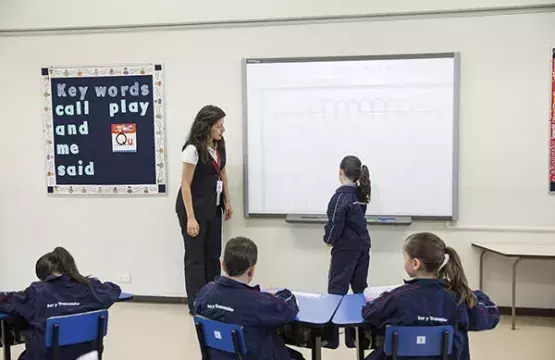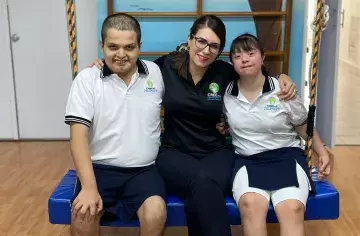Description
In the Specialization in Neuropedagogy and Didactics, you will go deep into the theory and practice of neuropedagogical sciences; considering the human brain as a social organ that can be modified by the teaching-learning processes, in both its biological and social make-up, aware that there can be no mind without a brain nor a brain without a social and cultural context.
Upon completion, you will be able to participate in educational studies, as well as provide specialized advice and consultancy related to Neuropedagogy and Didactics.
This program serves as a natural bridge between the Bachelor’s degree in Education and the Master’s degree in Educational Sciences.
year in duration
courses to be taken in the specialty
Objective
The purpose of this Specialization in Neuropedagogy and Didactics is to turn educational science students into professionals in the theoretical and practical fields of neuropedagogical sciences, considering the human brain a social organ, and therefore an organ that is capable of being modified by the teaching-learning processes, in both its biological make-up and its social make-up.
In the program, the students will have access to courses related to language neuroscience, literary skills, bilingualism, the development of mathematical reasoning, education for innovation, creativity, and the arts, among others.

Admission Profile
In order to pursue the Specialization in Neuropedagogy and Didactics, you should…
- Have a professional degree in Education, Psychopedagogy or related careers.
- Know the theoretical foundations of educational processes.
- Know how to apply educational tools and/or knowledge in professional practice.
- Know the basics of teaching-learning processes.
- Show openness to new knowledge and have the habit of studying and participating in continuing education activities.
- Understand and be able to translate from and into English.
Graduate Profile
Upon completion of this specialty, you will have developed the following knowledge:
- A command of the areas of educational studies.
- Application of multi-disciplinary knowledge oriented to the development of the different areas of Neuropedagogy and Didactics.

Upon completion of this specialty, you will have developed the following skills:
- Analyzing phenomena related to Neuropedagogy and Didactics.
- Advising on issues related to Neuropedagogy and Didactics.
- Solving practical problems through the tools and knowledge of Neuropedagogy and Didactics.
- Academic Leadership.
- Advising on educational projects.
- Participation in teaching.

Upon completion of this Specialization in Neuropedagogy and Didactics, you will have developed the following attitudes:
- Having a critical ability regarding the regulation in place for the generation of alternative proposals in the different fields of education.
- Applying collaboration and results-orientation.
- Demonstrating leadership, ethics, and professionalism.
- Developing and increasing social responsibility.
- Learning autonomously to continue your training and education in the cognitive skills and the relevant knowledge applied to your scientific and professional activities.

Live an experience abroad
Have an academic experience abroad for a summer, a semester or a year.
See moreCurriculum
Consult the courses that you will take in the Specialization in Neuropedagogy and Didactics.
The program has a duration of three quarters.
| Course | Credits |
|---|---|
| Neuroscientific foundations of learning | 6 |
| Neuroscience of language, literary skills, and bilingualism | 9 |
| Course | Credits |
|---|---|
| The family system and the formation of educational communities | 6 |
| Neuroscience of the development of mathematical reasoning and science | 9 |
| Course | Credits |
|---|---|
| Development of socio-emotional skills | 6 |
| Education for innovation, creativity, and the arts | 9 |
Stories
Learn about the success stories of our graduates.








